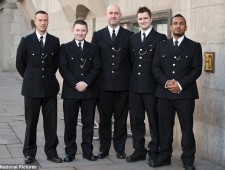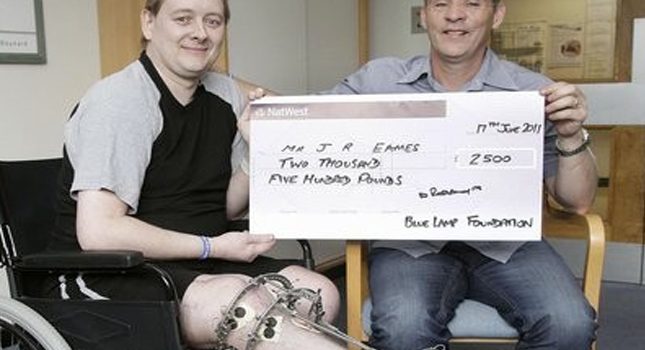
Names: PC Alastair Hinchliff, PC Andrew Harding and PC Andrew Robb
Background
Alastair Hinchliff, Andrew Harding and Andrew Robb from the Metropolitan Police Force, were among five Police Officers called to an incident in Kenton Road, Harrow, on a winter’s morning in November 19, 2011, following reports that a man was acting suspiciously and shouting at members of the public.
After arriving on the scene, the officers tried to speak to the man, who was talking to himself and calling for the help of God. The officers attempted to restrain the man, but he broke free and, as other officers started to attend the incident, he started to throw things, including cans of food and a breeze block at the officers.
Other officers arriving at the scene used CS spray and baton rounds to incapacitate the man, but they had little effect. The man made his way towards a Halal Butchers shop. When the man moved to the rear of the shop, he was temporarily held against a wall by a member of staff. With the life of a member of the public under now under threat, the three officers were amongst those who entered the shop with short shields, with the intention of containing the man in the shop.
The man armed himself with an eight-inch fillet knife and attacked the officers. PC Harding fell onto his back and was stabbed nine times by the man, with one of the strikes entering his stomach, causing life threatening injuries. Assisting their colleague, PC Robb was stabbed in the leg, and PC Hincliff was stabbed in the neck, face and arm. Other officers entering the shop were eventually able to overpower the assailant.
As a result of the attack, PC Harding received a stab wound to his head, seven to his stab-proof vest and one to his side, which required immediate emergency surgery at St Mary’s Hospital in Paddington, resulting in the removal of seven inches of the officer’s bowel, which had been perforated by the knife.
PC Robb was stabbed twice in the left leg, causing two wounds six inches in length, for which the officer required numerous hospital visits and extensive physiotherapy.
PC Hincliff suffered six stab wounds, including to his left index finger, left wrist, left bicep, upper lip, left temple and jaw, and his upper head, which resulted in a one week stay in the Trauma ward at St Mary’s Hospital, Paddington.
How did the Blue Lamp Foundation help?
- PC Andrew Harding: The officer lives in High Wycombe, and the majority of his family, including his mother and sister, live in Buckinghamshire and Berkshire. They incurred train travel costs to visit him in hospital of more than £600. As a result of a claim to the Blue Lamp Foundation, PC Harding received a £480 grant to reimburse the travel expenses of his family.
- PC Andrew Robb: The officer applied to the Blue Lamp Foundation for a grant of £100 to cover the costs of attending hospital visits, including visits to St Mary’s in Paddington and St Thomas’ in South London, from his home in Hendon, and a commendation ceremony for the incident (approximately 40 journeys), which was attended by the officer and his parents.
- PC Alastair Hincliff: The officer applied to the Blue Lamp Foundation for a grant of £386.91 towards the cost of travel and subsistence costs, incurred by his parents and sister, who visited the injured officer repeatedly, during his stay on the Trauma ward at St Mary’s Hospital.
The impact this help had on the individual’s life
As a result of the grants approved by the Blue Lamp Foundation, the three officer’s recovery was aided by the constant support of their families, which was made possible by the financial support received from the charity.
On his application, PC Hincliff wrote: “Their (his family) caring nature and endless support meant a lot to me in the weeks following the incident and has ultimately helped me to deal with the whole incident.”
Despite PC Harding failing to submit his claim within a 90 day cut off period for claims following the incident, the Blue Lamp Foundation still contributed more than three quarters of the total costs applied for (£480). PC Harding wrote on his claim form at the time: “Your charity does fantastic work, and money raised for my injuries, along with my colleagues, has been donated to your cause. I hope that you are able to help my family, who were left out of pocket to see me whilst I was recovering, but I understand fully that the 90 day claim time has elapsed.”
The future
All the officers made good recoveries, thanks to the intervention of medical staff at the time of the incident, and in the months following. The three injured officers, along with others attending the scene, were awarded the Police Federation London region Police Bravery Award for their role in apprehending the suspect, who was remanded to Broadmoor Hospital.





